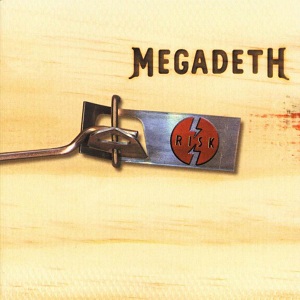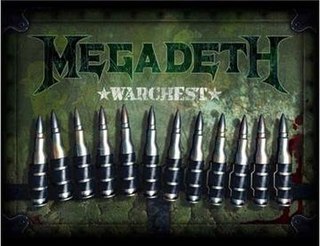
Megadeth is an American thrash metal band formed in Los Angeles in 1983 by vocalist/guitarist Dave Mustaine. Known for their technically complex guitar work and musicianship, Megadeth is one of the "big four" of American thrash metal along with Metallica, Anthrax, and Slayer, responsible for the genre's development and popularization. Their music features complex arrangements and fast rhythm sections, dual lead guitars, and lyrical themes of war, politics, religion, death, and personal relationships.

Killing Is My Business... and Business Is Good! is the debut studio album by American thrash metal band Megadeth, released on June 12, 1985, by Combat Records. At the beginning of 1985, the band was given $8,000 by Combat to record and produce its debut album. The band was forced to fire their original producer and produce the album by themselves, after spending half of the album's budget on drugs, alcohol, and food. Despite the poor production, the album was a well-received effort that obtained strong reviews in various music publications. Killing Is My Business... and Business Is Good! played an essential role in establishing thrash metal as an authentic subgenre of heavy metal music. It explores themes of death, occultism, and violence.

Rust in Peace is the fourth studio album by American thrash metal band Megadeth, released on September 24, 1990, by Capitol Records. It was the first Megadeth album to feature guitarist Marty Friedman and drummer Nick Menza. The songs "Hangar 18" and "Holy Wars... The Punishment Due" were released as singles. A remixed and remastered version of the album featuring four bonus tracks was released in 2004.

Countdown to Extinction is the fifth studio album by American thrash metal band Megadeth, released on July 14, 1992, through Capitol Records. It was the group's second studio release to feature the "classic" lineup of Dave Mustaine, Marty Friedman, David Ellefson and Nick Menza, with all of them contributing to songwriting on the album. The album features some of the band's best known songs such as "Symphony of Destruction", "Sweating Bullets", and "Skin o' My Teeth", which enjoyed significant chart success and made a great musical impact.

Hidden Treasures is an EP by American thrash metal band Megadeth, released on July 18, 1995, via Capitol Records. The album features songs that originally appeared on film soundtracks and tribute albums. Four of the tracks were released as singles, and three have received Grammy Award nominations for Best Metal Performance. Despite having garnered mediocre or negative reviews, the material on the EP has been credited with helping expand the group's MTV audience in the early 1990s.

Cryptic Writings is the seventh studio album by American heavy metal band Megadeth. Released on June 17, 1997, through Capitol Records, it was the band's last studio album to feature drummer Nick Menza. His departure would mark the end of the band's longest lasting lineup to date, having recorded four studio albums. Megadeth decided to produce the record with Dann Huff in Nashville, Tennessee, because they were not satisfied with their previous producer Max Norman. The album features twelve tracks with accessible song structures, specifically aimed for radio airplay. The lyrics were also altered, in order to make the music more inclusive for wider audience. These changes were met with mixed opinions from music critics, who noted the band moving away from their thrash metal roots.

Risk is the eighth studio album by American heavy metal band Megadeth, released on August 31, 1999, by Capitol Records, the band's last album to be released by the label. The first Megadeth album since 1990 to feature a lineup change, Risk marks the studio debut of drummer Jimmy DeGrasso with the band, as well as the final appearance of longtime guitarist Marty Friedman, who announced his departure a year later. Meant to be a breakthrough on alternative rock radio, Risk received a mixed response because of the great deviation from the band's traditional sound. The backlash ultimately resulted with the band returning towards a heavier sound with their next album.

The World Needs a Hero is the ninth studio album by American thrash metal band Megadeth, released on May 15, 2001, by Sanctuary Records. After the critical and commercial failure of the previous album Risk (1999), The World Needs a Hero represented a change back to a heavier musical direction. Subsequently, the album charted at number 16 on the Billboard 200 upon release.

David Scott Mustaine is an American musician. He is the co-founder, frontman, primary songwriter and sole consistent member of the thrash metal band Megadeth. Mustaine has released sixteen studio albums with Megadeth, sold over 38 million records worldwide, with six albums platinum-certified, and won a Grammy Award for Best Metal Performance in 2017 at the 59th Grammy Awards, for the title track of their fifteenth studio album, Dystopia.

"Trust" is a song by American heavy metal band Megadeth from their seventh studio album, Cryptic Writings. It was released on May 8, 1997 in both English and Spanish language versions. The song, which tells the story of relationships that have failed due to mutual dishonesty, had significant airplay and MTV rotation and reached No. 5 on the Billboard Mainstream Rock Tracks chart. It is Megadeth's most successful single to date, followed by "Breadline" and "Crush 'Em" from their follow-up album Risk, both of which reached No. 6 in the same charts. "Trust" was later included on the three compilation albums Capitol Punishment, Back to the Start and Anthology: Set the World Afire, as well as on the box set Warchest. The song was nominated for a 1998 Grammy award for Best Metal Performance.

"Hangar 18" is a song by American thrash metal band Megadeth from their 1990 studio album Rust in Peace. The song was inspired by a mythical building purportedly located at Wright-Patterson Air Force Base near Dayton, Ohio, where an alien spacecraft or bodies were supposedly stored. The song reached number 25 on the Irish Singles Chart, also reached number 26 on the UK Singles Chart.

"Holy Wars... The Punishment Due" is a song by American thrash metal band Megadeth. Released in 1990, it is the opening track off the band's fourth studio album Rust in Peace (1990).

"99 Ways to Die" is a song by the American thrash metal band Megadeth. The song was recorded for the soundtrack to The Beavis and Butt-head Experience, and was released as a single and a music video. The song was nominated in the "Best Metal Performance" category at the 1995 Grammy Awards.

Warchest is a box set from the American heavy metal band Megadeth. Warchest features five discs and features studio tracks, demos and live recordings of a number of the band's songs from its first ten studio albums and rarities EP. The box set was released on October 9, 2007 by EMI/Capitol Records, and sold around 1,100 copies in the United States in its first week.

Endgame is the twelfth studio album by American thrash metal band Megadeth. It was produced by Dave Mustaine and Andy Sneap and released through Roadrunner Records on September 15, 2009. Endgame was the first album to feature guitarist Chris Broderick, following Glen Drover's departure in 2008, and was the band's last studio album with bassist James LoMenzo until he rejoined after 2022's The Sick, The Dying, and The Dead, as original bassist David Ellefson rejoined the band several months after Endgame was released.

"The Right to Go Insane" is a song by American heavy metal band Megadeth, written by Dave Mustaine. It is the final track and second single from their twelfth studio album Endgame. The song was commercially released as a single on April 9, 2010, and a music video was released directed by Bill Fishman, who produced the music video of the band's previous single, "Head Crusher". The music video was based on the real-life events surrounding Shawn Nelson's descent into madness and the famous tank rampage he engaged in which led to his death.

"Sudden Death" is a song by American heavy metal band Megadeth. It was written by Dave Mustaine for inclusion in the 2010 music video game Guitar Hero: Warriors of Rock, which was released on September 28, 2010, in North America. The song itself was released as a single with cover art on iTunes on September 24, 2010, and on September 28, Roadrunner Records made the song available for streaming on its website.

Thirteen is the thirteenth studio album by American thrash metal band Megadeth. It was first released in Japan on October 27, 2011, and worldwide on November 1, 2011. It is the first Megadeth studio album since The World Needs a Hero (2001) to feature bassist and founding member David Ellefson, who returned to the band in 2010. Thirteen debuted at number 11 on the Billboard 200 chart, selling 42,000 copies in its first week. The album broke into the top 20 in several other markets as well. It has sold about 120,000 copies in the United States as of December 2012. The album has received positive reviews from critics.

Dystopia is the fifteenth studio album by American thrash metal band Megadeth. It was released on frontman and guitarist Dave Mustaine's Tradecraft label via Universal on January 22, 2016. It is the first Megadeth album to feature guitarist Kiko Loureiro, the only album with drummer Chris Adler, and their last with bassist David Ellefson. The album was produced by Mustaine and Chris Rakestraw and features cover artwork by Brent Elliot White.
"Dystopia" is a song by American heavy metal band Megadeth, written by Dave Mustaine. It is the second and title track from their fifteenth studio album Dystopia, which was released on January 22, 2016. The song was released early on streaming services on January 7, 2016.



















